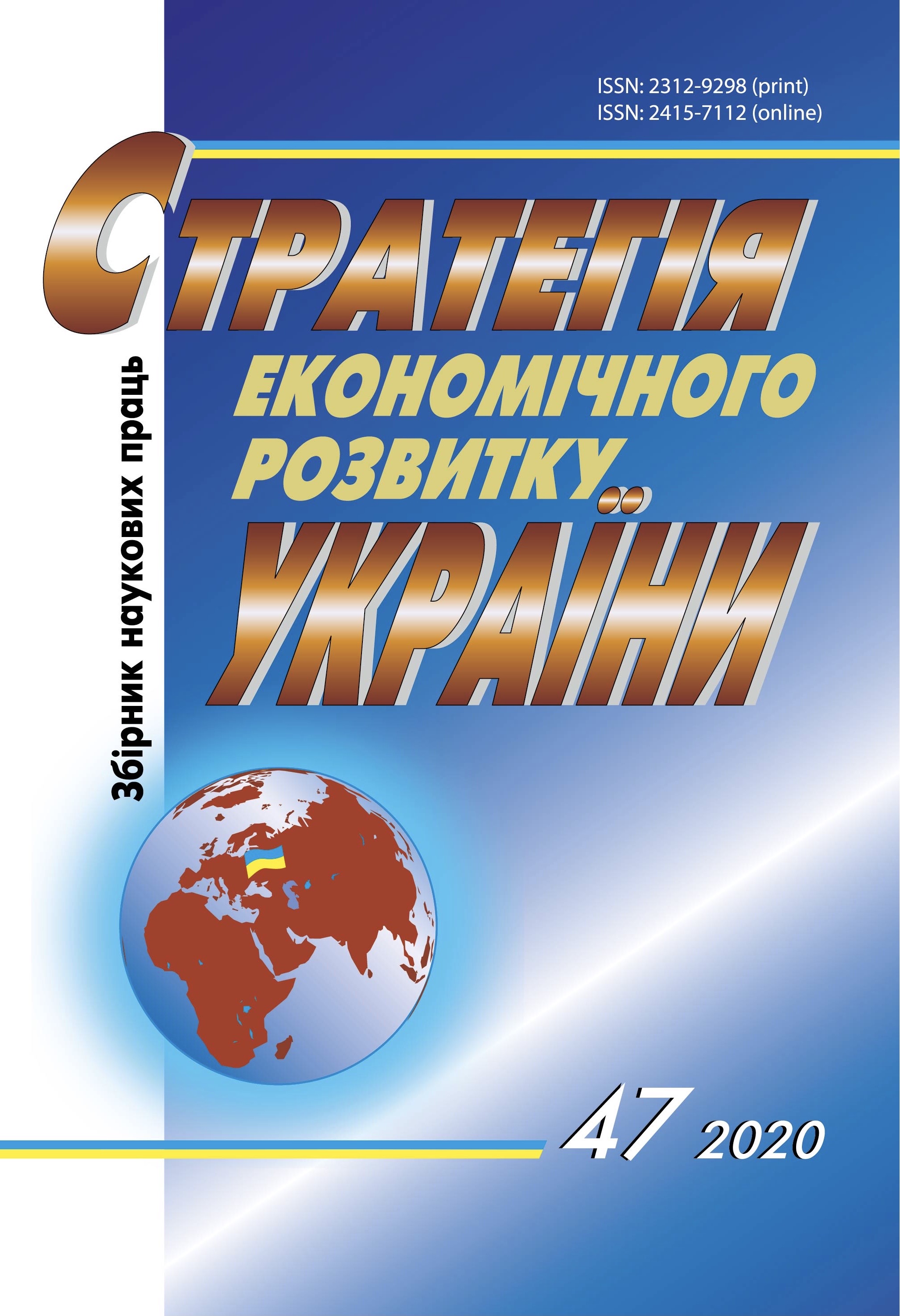СТРУКТУРНИЙ ПІДХІД ДО ВИЗНАЧЕННЯ ВИДІВ КОРПОРАТИВНОЇ ІДЕНТИЧНОСТІ ПІДПРИЄМСТВА
DOI:
https://doi.org/10.33111/sedu.2020.47.042.056Ключові слова:
ідентичність, корпоративна ідентичність, стратегія, класифікація, методика, бізнес-економіка, стратегічний менеджментАнотація
У статті розглянуто питання особливостей визначення поняття корпоративної ідентичності та класифікації її видів. Проведено критичний аналіз праць науковців щодо трактування взаємозв’язку між ідентичністю і стратегією підприємств, визначено термін ідентичність у контексті стратегічного управління та розглянуто їх протиріччя у понятійно-категоріальному апараті. Представлено існуючі класифікації видів корпоративної ідентичності та метод їх аналізу. З метою досягнення максимального результату аналізу корпоративної ідентичності автори пропонують не лише дотримуватись визначеного міждисциплінарного підходу, але і розглядати взаємозв’язок між елементами структурної класифікації видів ідентичності з урахуванням їх порівняння. Такий структурний підхід дозволяє визначити кожен з видів ідентичності для виявлення дисонансу між ними та надати рекомендації щодо їх усунення з метою вдосконалення стратегії підприємства.Посилання
Cornelissen, Joep P., Alexander S. Haslam, and John M.T. Balmer. “Social Identity, Organizational Identity and Corporate Identity: Towards an Integrated Understanding of Processes, Patternings and Products.” British Journal of Management 18, no. 1 (2007): 1–16. doi: 10.1111/j.1467-8551.2007.00522.x.
Balmer, John M.T., Helen Joyce Stuart, and Stephen A. Greyser. “Aligning Identity and Strategy: Corporate Branding at British Airways in the Late 20th Century.” California Management Review 51, no. 3 (Spring 2009): 6–23. doi:10.2307/41166491.
Whetten, David A. “Albert and Whetten Revisited: Strengthening the Concept of Organizational Identity.” Journal of Management Inquiry 15, no. 3 (September 2006): 219–34. doi:10.1177/1056492606291200.
Abratt, Russell and Kleyn, Nicola. “Corporate identity, corporate branding and corporate reputations: Reconciliation and integration.” European Journal of Marketing 46, no. 7/8 (2012): 1048–1063. doi:10.1108/03090561211230197.
Melewar, T.C. and Karaosmanoglu, Elif. “Seven dimensions of corporate identity: A categorisation from the practitioners’ perspectives.” European Journal of Marketing 40, 7/8 (2006): 846–869. doi:10.1108/03090560610670025.
Van Riel, Cees B.M. and Balmer, John M.T. “Corporate identity: the concept, its measurement and management.” European Journal of Marketing 31, no. 5/6 (1997): 340– 335. doi:10.1108/eb060635.
Gioia, Dennis A., Majken Schultz, and Kevin G. Corley. “Organizational Identity, Image, and Adaptive Instability.” The Academy of Management Review 25, no. 1 (2000): 63– 81. doi:10.2307/259263
Ashforth, B.E., J.R. Moser, and P. Bubenzer,. “Identities and Identification: Beyond Our Fixation on the on the Organization.” In The Oxford Handbook on Identities in Organizations Edited by A.D. Brown. Oxford: Oxford University Press, 2020.
Davide Ravasi, Violina Rindova, and Ileana Stigliani. (2019). “The Stuff of Legend: History, Material Memory and the Temporality of Identity Construction.” Academy of Management Journal 62, no. 5 (2019):1523–1555. doi:10.5465/amj.2016.0505.
Balmer, John M.T. “The corporate identity, total corporate communications, stakeholders’ attributed identities, identifications and behaviours continuum.” European Journal of Marketing 51, no. 9/10 (2017): 1472–1502. doi:10.1108/EJM-07-2017-0448.
Olins, Wally. Corporate Identity: Making Business Strategy Visible through Design. London: Thames and Hudson, 1989.
He, Hongwei and John M.T. Balmer. “Identity studies: Multiple perspectives and implications for corporate-level marketing.” European Journal of Marketing 41, no. 7/8 (2007): 765–785. doi:10.1108/03090550710752393
Van Riel, Cees B.M., and Charles J. Fombrun. “Measuring Corporate Identity.” In Essentials of Corporate Communication Implementing Practices for Effective Reputation Management. Taylor & Francis Group (2007): 80–106.
He, Hongwei, and John M.T. Balmer. “A grounded theory of the corporate identity and corporate strategy dynamic.” European Journal of Marketing 47, no. 3/4 (2013): 401–430. doi:10.1108/03090561311297391.
Melewar, T.C. “Determinants of the corporate identity construct: A review of the literature.” Journal of marketing Communications 9, no. 4 (2003): 195–220. doi:10.1080/ 1352726032000119161
Balmer, John M.T. and Stephen A. Greyser. “Managing the Multiple Identities of the Corporation.” California Management Review 44, no. 3 (2002): 72–86. doi:10.2307/41166133.
Balmer, John M.T. and Guillaume B. Soenen. “The Acid test of corporate identity management.” Journal of Marketing Management 15, no. 1-3 (1999): 69–72. doi:10.1362/026725799784870441.
Tourky, Marwa, Sharifah Faridah Syed Alwi, Philip J. Kitchen, T.C. Melewar, and Ahmed S. Shaalan. “New Conceptualization and Measurement of Corporate Identity: Evidence from UK Food and Beverage Industry.” Journal of Business Research 109 (2020): 595–606. doi:10.1016/j.jbusres.2019.03.056.
He, Hongwei. “Corporate identity anchors: A managerial cognition perspective.” European Journal of Marketing 46, no. 5 (2012): 609–625. doi:10.1108/03090561211212449.
Abratt, Russell, and Michela Mingione. “Corporate Identity, Strategy and Change.” Journal of Brand Management 24, no. 2 (2017): 129–39. doi:10.1057/s41262-017-0026-8.
Van De Ven, Andrew H., and Marshall Scott Poole. “Explaining Development and Change in Organizations.” The Academy of Management Review 20, no. 3 (1995): 510–40. doi: 10.2307/258786
Balmer, John M.T. “Strategic corporate brand alignment: Perspectives from identity based views of corporate brands.” European Journal of Marketing 46, no. 7/8 (2012): 1064– 1092. doi:10.1108/03090561211230205
Brown, Andrew D. “Identities in Organizations: Some Concluding Thoughts.” In The Oxford Handbook of Identities in Organizations. Oxford, UK: Oxford University Press, 2020 Ж 896–908. doi:10.1093/oxfordhb/9780198827115.001.0001.


